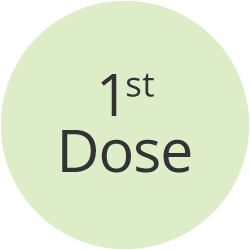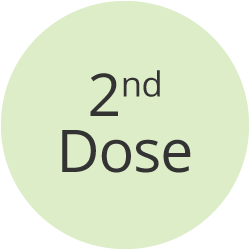Vaccine (Shot) for Mumps

Two doses of the MMR shot are recommended for children by doctors as the best way to protect against measles, mumps, and rubella.
When should my child get the MMR shot?
One dose at each of the following ages:
Before traveling to another country, infants 6 to 11 months should get 1 dose of the MMR shot.
Why should my child get the MMR shot?
- Protects your child from mumps, a potentially serious disease, as well as measles and rubella.
- Protects your child from getting a fever and swollen glands under the ears or jaw from mumps.
- Keeps your child from missing school or childcare and you from missing work.
Almost everyone who has not had the MMR shot will get mumps if they are exposed to the mumps virus.
The MMR shot is safe.
The MMR shot is very safe, and is effective at preventing mumps. Vaccines like a medicine, can have side effects. These are usually mild and go away on their own.
There is no link between the MMR shot and autism.
Scientists in the United States and other countries have carefully studied the MMR shot. None has found a link between autism and the MMR shot.
Scientists in the United States and other countries have carefully studied the MMR shot. None has found a link between autism and the MMR shot.
What are the side effects of the shot?
Most children don’t have any side effects from the shot. The side effects that do occur are usually mild, and may include:
- Soreness, redness, or swelling where the shot was given
- Fever
- Mild rash
- Temporary pain and stiffness in the joints
More serious side effects are rare. These may include high fever that could cause a seizure.
Prepare for your child's vaccine visit and learn about how you can:
- Research vaccines and ready your child before the visit
- Comfort your child during the appointment
- Care for your child after the shot
What is mumps?
Mumps is best known for the puffy cheeks and swollen jaw that it causes.
Mumps spreads easily through coughing and sneezing. There is no treatment for mumps, and it can cause long-term health problems.
What are the symptoms of mumps?
Mumps usually causes the following symptoms for about 7 to 10 days:
- Fever
- Headache
- Muscle aches
- Tiredness
- Loss of appetite (not wanting to eat)
- Swollen glands under the ears or jaw
Some people who get mumps do not have symptoms. Others may feel sick
but will not have swollen glands.
but will not have swollen glands.
Is it serious?
Mumps can be dangerous. Before there was a vaccine, mumps was one of the most common causes of deafness and meningitis. Mumps can also lead to encephalitis.
In most children, mumps is pretty mild. But it can cause serious, sometimes lasting problems, including:
- Meningitis (swelling of the tissue covering the brain and spinal cord)
- Deafness (temporary or permanent)
- Encephalitis (swelling of the brain)
- Orchitis (swelling of the testicles) in males who have reached puberty
- Oophoritis (swelling of the ovaries) and/or mastitis (swelling of the breasts) in females who have reached puberty
In rare cases, mumps is deadly.
How does mumps spread?
Mumps is a contagious disease caused by a virus. It spreads through direct contact with saliva or respiratory droplets from the mouth, nose, or throat. An infected person can spread the virus by
- coughing, sneezing, or talking
- sharing items that may have saliva on them, such as water bottles or cups
- participating in close-contact activities with others, such as playing sports, dancing, or kissing
- touching objects or surfaces with unwashed hands that are then touched by others
An infected person can likely spread mumps from two days before their salivary glands begin to swell to up to five days after the swelling begins. A person with mumps should limit their contact with others during this time. For example, stay home from school and do not attend social events.
Follow the vaccine schedule
The Centers for Disease Control and Prevention, American Academy of Family Physicians, and American Academy of Pediatrics strongly recommend children receive all vaccines according to the recommended vaccine schedule.
- Get a list of vaccines that your child may need based on age, health conditions, and other factors.
- Learn the reasons you should follow the vaccine schedule.























.png)












No hay comentarios:
Publicar un comentario